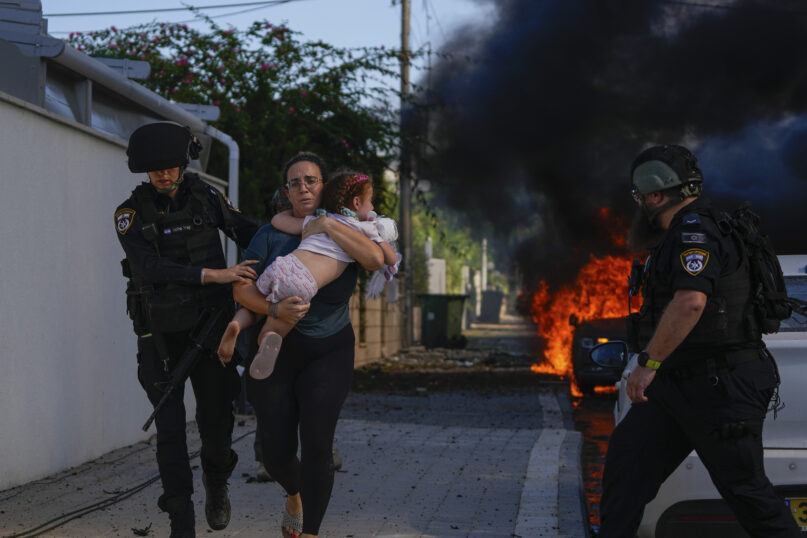(RNS) — Fifty years ago, almost to the day, Egypt and Syria launched a surprise attack against Israel on Yom Kippur, the holiest of days in the Jewish faith. That attack transformed the landscape of the Middle East, as well as Israel itself.
The heinous surprise attack Saturday (Oct. 7) by Hamas, with thousands of rockets raining down on Israeli population centers and credible reports of terrorists infiltrating southern Israel, comes as the Middle East is already moving toward transformation. We fear it will now be for the worse.
As of 8 p.m. Saturday in Israel, more than 200 Israeli civilians have been killed, with more casualties being reported by the hour.
There is something uniquely heinous about attacking Israeli civilians during Jewish holidays and on the anniversary of the Yom Kippur War. It is deliberately intended to desecrate one of the holiest days of the Jewish year and impede what would otherwise be joyous religious and cultural practices.
As the rockets rained down, some Israelis were sitting in their Sukkot — temporary dwellings to mark the change of seasons, bless the harvest and remind observers of the ephemeral nature and ongoing changes inherent to life. Many were preparing for Simchat Torah, the restart of the lectionary cycle and an occasion for dancing as Jews publicly celebrate the continual learning at the heart of the faith.
There will not be dancing in the streets with the Torah tonight, but instead hiding in bomb shelters.
There is no way to make sense of such viciousness, but it bears noting that Hamas attacked Israel as serious, high-level peace negotiations were being conducted between Israeli and Saudi leaders. Hamas, backed by Saudi Arabia’s archrival, Iran, may be intent upon disrupting peace talks with violence, thereby possibly regaining some of Hamas’ power after the Abraham Accords had relegated it to the sidelines.
Some are asserting that these attacks on Israeli civilians are a natural and necessary response to the Israeli occupation and injustice that Palestinians face on a regular basis. Saturday’s attacks only buttress the imperative of pursuing the long-sought two-state solution that guarantees an independent Palestinian state and an end to the Israeli military presence in the West Bank — much as it withdrew from Gaza in 2005. But there is never a justification for deliberately attacking civilians.
Our hopes amid this moment of suffering for Israeli civilians are threefold: First, we hope for an immediate cessation of terrorist attacks and an Israeli response that disables Hamas violence with as few civilian casualties as possible. Second, we hope that Israeli and Saudi leaders boldly continue with their peace talks, perhaps even with a renewed sense of urgency.
Lastly, we hope that American Jews find a way both to show unconditional love for our brethren without faltering in our support for Israeli democracy and the need to maintain the separation of powers within the Israeli government. Supporting Israel’s right to self-defense does not mean supporting every government policy, nor even the current governing coalition.
While we fear that the conflict will get far more painful in the coming days, for Israelis and Palestinians alike, such suffering need not be the end of the story. The Middle East is filled both with storm clouds and rays of hope. We need to magnify the light.
To this end, we suggest donating to Israeli humanitarian organizations, especially United Hatzalah, Magen David Adom and other groups that save lives, irrespective of religious, national or ethnic background. We advocate learning with nuance and care, not only about the Middle East conflict, but also the cultures, languages, beliefs and ways of life across the diverse tapestries of Israeli and Palestinian societies.
Visiting in person is still the most powerful and effective way to behold the beautiful complexity (and multiplicity) of Israeli and Palestinian stories. For educational experiences closer to home, there are numerous Israeli cultural opportunities in the United States — from restaurants and performance venues to museums and films.
We affirm Israel’s right to defend itself and secure its borders militarily, and yet we grieve the loss of every innocent life lost, irrespective of background. We feel deep compassion for the Palestinian people caught (sometimes literally) in the crossfire. Violence begets violence, and we pray that this conflict comes to a swift end.
Am Yisrael Chai — the people of Israel live and, we pray, will soon live in peace.
(Rabbi Joshua Stanton and Cantor Olivia Brodsky are spiritual co-leaders of East End Temple in Manhattan. Stanton also serves as director of leadership at Clal. The views expressed in this commentary do not necessarily reflect those of Religion News Service.)





